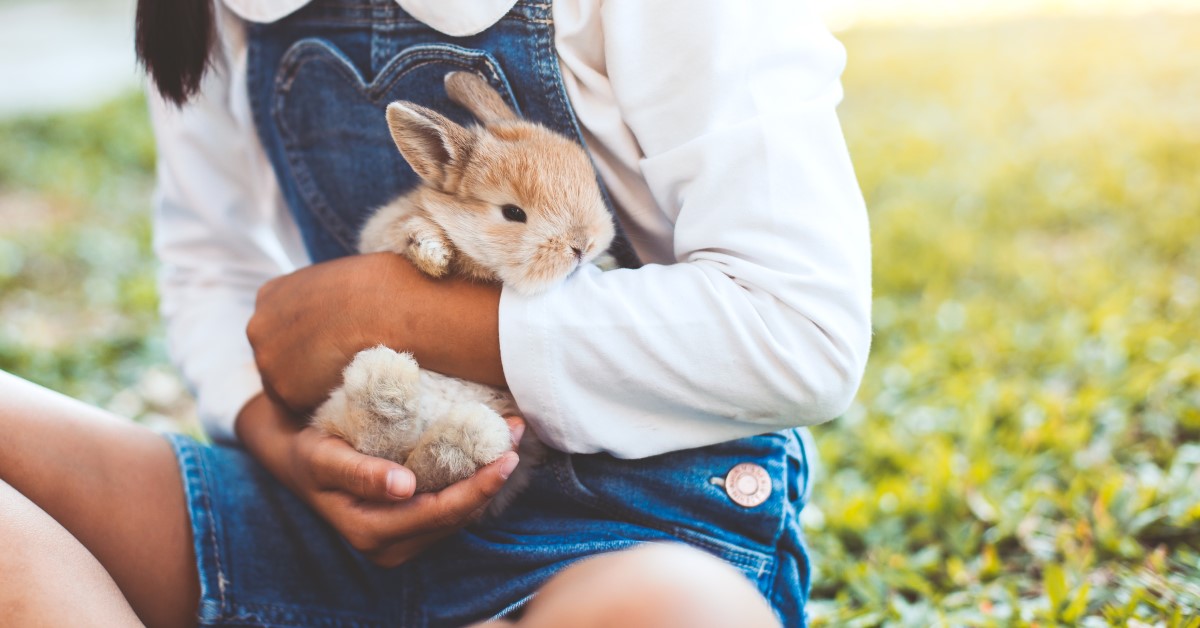Ask Dr. Jenn: I want to get my kids a bunny for Easter. Do bunnies make good pets?
I think it would be fun to get a pet bunny for my kids for Easter. Do you have any advice about pet rabbits?

Let me start by warning you that a bunny is not just a “fun Easter present”. A rabbit is a living animal that requires as much care, time, and expense as a pet dog or cat. They have special dietary requirements, unique health care issues, and need daily exercise. With an average life span of seven to ten years, a pet rabbit is a long-term commitment.
If you decide you are ready to make that commitment, rabbits can be excellent pets. They are friendly, sociable, and adorable. They don’t make a lot of noise and are relatively neat. They can be trained to use a litter box.
Before you bring home your Easter bunny, make sure you have everything you need. Your pet rabbit will need a safe place to stay in when not supervised. For most people, this is a cage or a rabbit hutch. The area of the cage should be at least four times the size of your rabbit and tall enough that he can stand on his hind legs without hitting his head on the top of the cage. Avoid a cage with wire flooring as this can cause foot problems. Many people will put bedding in with the bunnies. Cedar bedding may smell good, but the aromatic wood has oils that can cause eye and skin irritation. Aspen bedding, recycled newspaper, or paper are much healthier options.
Rabbits need a space to run, hop, and play for a few hours a day, ideally in the morning or evening when they are most active. A pet exercise pen that is at least three feet high works well. Many of the pens are portable and can be moved out into the grass during the warmer months. If you choose to let your rabbit hop around your house, make sure the area is bunny proofed. Rabbits love to chew on things so make sure all cords are covered or out of reach and there are no toxic plants in the area. Make sure there are no escape routes, keeping in mind that bunnies can hop fairly high and squeeze into small spaces.
Rabbits have a unique digestive tract, so a proper diet is essential to their overall health. Grass hay is a major portion of their diet and should be available at all times. Examples of grass hay include timothy hay and meadow grass. Avoid alfalfa hay as this is higher in calories which may lead to obesity and high levels of calcium which can lead to urinary crystals and sludge. Salad greens provide essential nutrients to their diet. Your pet rabbit should be offered a variety of greens daily. Examples of greens include different types of lettuce, kale, dandelions, broccoli, carrot tops, and celery leaves. Fruits can be used as treats, but only sparingly. You can also offer your pet bunny commercially available rabbit pellets, but they should only be a small portion of their diet.
Rabbits have another unique trait in that they produce and eat special fecal pellets called cecotropes. Rabbit cecotropes are comprised of microorganisms from a special part of the digestive tract called the cecum. The microorganisms provide important nutrients, such as amino acids, vitamins, and fatty acids that rabbits need to stay healthy. Cecotropes do not contain waste products like most fecal pellets. Rabbits usually eat the cecotropes directly from the anus so you may not even see them.
This is just some basic information you should know before you put a bunny in your child’s Easter basket. Talk to your veterinarian about potential health issues, whether you should have your rabbit spayed or neutered, and what species of rabbit may be best for your household. If you realize you are not ready for the commitment of a live rabbit, there are many adorable bunny stuffies available this time of year that would look adorable in an Easter basket. Stuffed bunnies also do a much better job of snuggling with your little ones at night.
Ready to start saving money on pet wellness care?
Then take a look at Mint Wellness, the pet wellness plan that provides fast reimbursement on routine pet care. Save on vaccinations, wellness exams, preventatives, dental, and more!
Learn More


